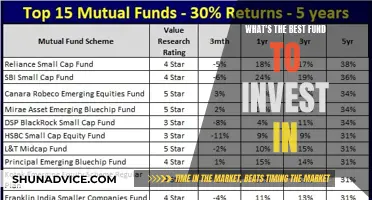
Small-cap stocks are publicly traded companies with a market capitalization between $250 million and $2 billion. Small-cap stocks are a good investment option for investors looking to get in on the ground floor of up-and-coming young companies with significant growth potential. Small-cap stocks have historically outperformed large-cap stocks, offering investors higher growth rates. However, small-cap stocks are also more volatile and riskier than large-cap stocks. Small-cap stocks are suited for investors who are willing to take on more risk for higher potential gains. Small-cap stocks can be individually purchased through a brokerage account, or investors can choose to invest in small-cap mutual funds or exchange-traded funds (ETFs).
| Characteristics | Values |
|---|---|
| Market Capitalization | $250 million to $2 billion |
| Potential for Growth | Higher than large-cap stocks |
| Share Price | Lower than large-cap stocks |
| Variety of Businesses | Not just start-ups |
| Popularity | Less popular than large-cap and mid-cap companies |
| Volatile Prices | More susceptible to volatile prices |
| Risk | Riskier than large-cap stocks |
| Available Information | Less information available than for large-cap and mid-cap stocks |
| Liquidity | Low liquidity |
What You'll Learn
- Small-cap stocks have more growth potential than large-cap stocks
- Small-cap stocks are more volatile and riskier than large-cap stocks
- Small-cap stocks are often young firms in their early growth stages
- Small-cap stocks are less popular and well-known than large-cap stocks
- Small-cap stocks are more susceptible to market volatility

Small-cap stocks have more growth potential than large-cap stocks
Small-cap stocks are stocks from public companies with a market capitalisation of between $250 million and $2 billion. Small-cap stock investors are generally looking for young, up-and-coming companies that are growing fast and will become large-cap stocks in the future.
Small-cap stocks have historically outperformed large-cap stocks, but they are also more volatile and riskier. Small-cap stocks tend to have higher growth potential than large-cap stocks, which usually offer investors stability and dividends but rarely fast growth.
Small-cap stocks have a greater chance of growth because they are smaller. They are often young companies with significant growth potential, but they are generally less stable than their larger, more established peers. Small-cap stocks tend to be more volatile than large-cap stocks, and their share values can fluctuate more dramatically.
Small-cap stocks can be a good investment. They typically have the potential for growth, which is often larger than that of large-cap stocks. However, small-cap stocks are more risky and volatile than the stocks of larger, more established companies. Therefore, investors must take extra care in their analysis before making any investment decisions.
T. Rowe Price Funds: Cruise Investment Options Explored
You may want to see also

Small-cap stocks are more volatile and riskier than large-cap stocks
Small-cap stocks are considered to be more volatile than large-cap stocks. This is reflected in the historical performance of small-cap companies, which have shown higher returns than large-cap companies, but with greater volatility. Small-cap stocks tend to offer greater returns over the long term, but this comes with greater risk compared to large-cap companies. The main reason for this higher volatility is that small-cap companies do not have the same resources as large-cap companies. They are more vulnerable to negative events and bearish sentiments, as they have fewer financial resources to fall back on.
Small-cap companies are also more nimble and can take more chances, which can lead to higher returns, but also increases risk. This is especially true during economic contractions, as small-cap companies are less equipped to cope with sharply decreasing demand. The higher volatility of small-cap stocks means that the returns realised by investors can vary significantly from the expected average return, making the investment potentially riskier. For example, from 1997 to 2012, the Russell 2000 (an index of small companies) returned 8.6% annually compared to 4.8% for the S&P 500 (consisting mainly of large companies). However, the Russell 2000 had approximately one-third higher volatility during the same period.
Large-cap companies, on the other hand, are typically safer investments, especially during downturns in the business cycle. They are more likely to weather changes without significant harm and are more attractive to investors, which contributes to their lower volatility. Large-cap companies also tend to pay dividend yields, providing more stability to their stocks.
While small-cap stocks are riskier and more volatile, they offer the potential for higher growth rates and superior returns compared to their larger competitors. Small-cap stocks are generally defined as having market capitalisations of about $250 million to $2 billion. They are often young companies with strong growth potential that investors hope will become large-cap stocks in the future. Small-cap stocks have the potential to generate outsized returns, sometimes growing 100 times or more above their original value.
In summary, small-cap stocks are riskier and more volatile than large-cap stocks due to their lack of resources and higher vulnerability to market changes. However, they offer the potential for higher returns and are attractive to investors seeking growth opportunities.
Cannabis Investment: Mutual Funds and the Green Rush
You may want to see also

Small-cap stocks are often young firms in their early growth stages
Small-cap stocks are stocks from public companies with a market capitalization of between $250 million and $2 billion. Small-cap investors are generally looking for up-and-coming young companies that are growing fast. They are looking for the large-cap stocks of the future.
Small-cap stocks have historically outperformed large-cap stocks, delivering superior returns over the long term. This means that investors in small-cap stocks have the potential to make large profits. However, it is important to note that small-cap stocks are also more volatile and riskier than large-cap stocks. They tend to be more susceptible to market volatility and have smaller customer bases, making their prospects more uncertain.
Overall, small-cap stocks offer a significant upside growth potential that is unmatched by larger companies, making them a compelling investment opportunity for those willing to take on the associated risks.
Choosing the Right Brokerage: Investment Funds Explained
You may want to see also

Small-cap stocks are less popular and well-known than large-cap stocks
Small-cap stocks are generally stocks from companies with a market capitalization of between $250 million and $2 billion. However, the precise definition of a small-cap stock varies among different brokerages, with some sources giving a range of $300 million to $2 billion.
Small-cap stocks are often associated with younger firms that are in the early stages of their growth. These companies are bringing new products and services to the market or creating entirely new markets. As such, small-cap stocks offer investors the opportunity to get in on the ground floor and potentially find the next Microsoft, Amazon, or Netflix.
However, it is important to note that small-cap stocks are less covered by analysts and financial institutions, and there is less publicly available information about these companies. This means that investing in small-cap stocks requires a solid understanding of company valuation and the time to do thorough research.
Additionally, small-cap stocks tend to be more volatile and carry more risk than large-cap stocks. They are more susceptible to market changes and have a greater potential for failure.
Bloomberg's Best Investment Fund Options: Where to Start?
You may want to see also

Small-cap stocks are more susceptible to market volatility
The higher volatility of small-cap stocks can be seen in their price movements. It is common for small-cap stock prices to fluctuate by 5% or more in a single trading day. This volatility can be challenging for investors who seek stable investments.
Additionally, small-cap stocks have lower liquidity, making it more difficult for investors to buy or sell shares at desired prices. The lower liquidity is due to the smaller size and lower popularity of these companies, which can also lead to a lack of information and analyst coverage.
While small-cap stocks offer higher growth potential, their greater volatility and risk should be carefully considered. These stocks are best suited for investors who are comfortable with higher risk and willing to accept greater potential gains.
Vanguard Funds: Gun Investments and Your Money
You may want to see also
Frequently asked questions
Small-cap growth funds focus on companies with high growth rates for earnings, sales, book value and cash flow. They tend to favour younger companies in their early growth stages, which means they have more potential for growth than larger companies.
Small-cap growth funds can provide investors with access to companies that are growing faster than their larger competitors. They also tend to be less popular, which means they are often priced below their value and can provide a solid return on investment.
Small-cap growth funds are considered riskier investments than large-cap stocks. They are more susceptible to volatility and it is common for their prices to fluctuate by 5% or more in a single day. It is also more difficult to sell shares when you want to exit the market.
Small-cap growth funds are portfolios that focus on companies with shares at the lower end of the market capitalisation range. They tend to favour companies in up-and-coming industries or young firms in their early growth stages.







